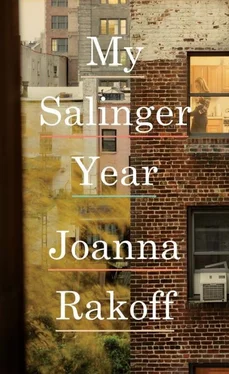“It’s Leigh’s,” he said, rolling his eyes. “She can’t find the energy to put it away, so she just throws it on the floor. Every once in a while, she decides to pick it all up and take it to the cleaners.” Laughing, he shook his head. “But she usually gives up after an hour.”
Leigh was tall and thin, so thin that her veins stood out from her pale skin like a topographical map, and her blond hair fell to her shoulders in greasy clumps. No matter what time I arrived at the apartment, she appeared to just be waking up, sleepily wandering out into the common room in a wrinkled silk kimono or a pair of faded men’s pajamas, her large blue eyes magnified by the thick lenses of her glasses, their frames so hideously unfashionable as to qualify as cool. Rarely did she leave the apartment, other than to grab a pack of cigarettes or a pint of milk, throwing on an old men’s coat over her pajamas. How she paid for these things—with bills crumpled in various pockets and ancient purses—was a mystery, for she had no visible means of income. According to Don, she came from wealth, true wealth, but her father had grown tired of supporting her shortly before I first walked through the door of their apartment in October. “He told her to get a fucking job,” Don explained, laughing, though this struck me as sad, rather than funny, as though Leigh were a character out of Wharton, constitutionally incapable of handling the demands of the postindustrial era.
No job had materialized, though I had seen her, on occasion, circling ads in the Voice , and now Leigh subsisted purely on coffee—thick and black, made from cheap espresso grounds in an old drip machine—and cigarettes, and the occasional box of generic-brand macaroni and cheese. “It’s a perfect food, if you think about,” she explained to me. “It’s got protein and carbohydrates”—she ticked these nutritional components off on her fingers—“and if you add a pack of frozen spinach, you’ve got a complete meal.” Her genteel background manifested itself largely in the form of advice. Where to drink real absinthe? Repair a cashmere sweater? Get one’s hair cut to perfection? Leigh knew, though she could no longer do such things herself. She drank cheap wine—usually purchased by someone else, like me—wore ragged sweaters, and hadn’t had a haircut in what looked like years.
Sometime in the middle of December, just before my interview at the Agency, I blew out my knee—an old injury, exacerbated by walking—so badly that I could barely move and was given a prescription for painkillers. I took one pill, which didn’t touch the pain in my knee but made my stomach churn and crept insidiously into my brain so that I couldn’t read, couldn’t think, could do nothing but sleep, as if in a coma, with dark, murky, horrible dreams, in which I was endlessly being chased by some nameless, faceless menace. When I woke, my throat was sore and I could barely move, not even to shift my body and sit up. I called for Don, but Leigh came instead.
“Are you okay?” she asked, putting one icy white hand on my forehead.
“I took this painkiller,” I croaked. “It was horrible.”
And then, as I watched, her face changed from friendly concern to calculation. “What painkiller?” she asked coolly.
“The bottle’s over there,” I told her.
“Vicodin,” she said reverently, picking it up and cradling it in her palm. “That’s what I thought.” She paused for a second, rattling the white pills in their amber bottle. “If you’re not going to take the rest, can I have them?”
My heart, already palpitating, began to beat faster. Why would she want the pills my orthopedist had given me for my knee? What on earth would she do with them? “Um, I should keep them,” I said. “I may need them.”
“Just one?” she asked, in a pleading tone that scared me.
“Maybe,” I said. “Let me think about it.” Reluctantly, she put the bottle down and left, petulantly. “I might need them,” I called.
A few hours later I woke to the sound of glass shattering and, a moment later, screams. In the hallway, a gust of freezing air shocked me out of my drugged fog. At the opposite end of the loft, I found Leigh sitting under a broken window, staring at her hand, which was covered in blood, jagged shards of glass sticking out of it. “Oh my God,” I cried, tamping down a wave of nausea.
“I’m okay,” she said dreamily. “It doesn’t hurt at all.” She looked up at me, but seemed to see through me or past me or at another me five yards behind me. “I only screamed because of the sound. The sound of the glass.” She pointed to the window. “The window broke.”
I looked from her face to her hand to the window, shivering in the cold air. “What happened?” I asked, incredulous. For I truly couldn’t fathom the scene before me.
“I put my hand through the window,” she said, still looking at her hand as if it were a specimen, as if marveling that it was attached to her own body.
“How?” I asked. “Why?” It occurred to me then that we needed to stop talking and get her to a hospital. The amount of blood on and around her was terrifying. I wondered if we were alone in the apartment building, if I should call an ambulance. Where was Don?
“I just wanted to. It looked so beautiful. I knew it wouldn’t hurt and it didn’t.”
Just then, there was a quick rap on the door, followed by the knob turning—Leigh had left it unlocked, yet again—and in walked a tall, handsome man of South Asian extraction—his black hair curling luxuriously around his ears, dusted white with snow—ridiculously underdressed for the weather in a cotton army jacket. We’d met once before, just for a moment, and I knew he was a friend of Leigh’s from Antioch, now a grad student in biology at Princeton. Pausing by the front door, he looked toward the kitchen, then toward Leigh’s bedroom, where I stood watching him, unable to speak. “Where is she?” he asked.
“Here,” I said. “She’s bleeding.”
“Leigh,” he cried, more exasperated than worried, walking past me, into the bedroom. “What did you—” Before he reached her, at the window, his eye went to her bureau, and mine followed it: to an amber bottle. That can’t be mine , I thought, as he grabbed it. She wouldn’t have . “Vicodin?” he asked, wearily. “Where did you get these?”
Leigh looked at me and smiled. “From Joanna,” she said. “She gave them to me.” She smiled wider. “Thank you, Joanna. You’re such a good kid.” Her smile turned into a grimace. “Don is such a little shit. You should dump him. You’re so pretty.”
Her friend, whose name, I remembered now, was Pankaj, was shaking the bottle. He cracked it open and counted the pills in his palm. “How many did you take?” he asked Leigh. She held up three bloody fingers. “Three?” he said. “ Three?” She nodded. He looked at me. “How many were in here?”
I wasn’t entirely sure. “Ten?” I said. “I took only one. This morning. I hurt my knee. I didn’t—” I paused here, unsure of whether I should take the time to explain that I absolutely hadn’t given her the pills. “Why would she take them?” Counting the pills back into the bottle, he looked at me strangely. “They made me sick,” I told him. “I threw up. All I could do was sleep. I couldn’t read. I had the worst dreams.”
“It’s fun,” called Leigh.
Her friend shook his lovely head and sighed. “You’re just lucky she didn’t sell them,” he said. Then he turned his attention to Leigh. “Okay, let’s get to the hospital.”
Later, when they returned with Leigh’s hand wrapped in pristine white gauze and sat down at the kitchen table with cold beers, Pankaj explained that Leigh had called him, sounding very strange, and he’d known something was wrong. He’d borrowed a car and driven to Brooklyn from Princeton in the snow. “I had,” he said, “an instinct.” I nodded. Don was still not home.
Читать дальше












